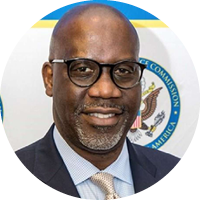
The Greek philosopher Aristotle said that by nature, man is a social animal. For Michael Winn, this quote has long resonated deeply with his desire to bring about positive change. While working as a sanitarian in the mid-1990s, Winn realized it was time to switch paths and pursue this passion through a career in public service. Shortly after beginning his job search, Winn was approached by an acquaintance working in the Bexar County Clerk’s Office regarding an open position as a contract specialist. Shortly thereafter, he was brought on staff. What he anticipated to be a 9:00-5:00 commitment quickly became a life-long passion.
As a contract specialist, Winn developed a foundational understanding of election processes in his jurisdiction and an awareness of how these procedures contributed to a cohesive statewide system. Winn continued to build upon this foundation as he rose through the ranks to become the Administrator of Elections in Harris County in 2019 and the Chief Deputy of Administration for the County Clerk’s Office one year later. According to Winn, his experience as an administrator has greatly facilitated his ability to educate voters on critical aspects of elections at the municipal, county, and statewide levels.
Given this background, Winn soon came to prioritize engagement with the community as Chief Deputy to better reach and educate his jurisdiction’s diverse voting population. Harris County, home to the city of Houston, boasts one of the most diverse populations in the nation. As of 2016, the County’s foreign-born population totaled approximately 1.2 million, with residents hailing from Mexico, El Salvador, India, and Vietnam, among others. Although Winn had previously held positions in Bexar and Travis counties, the diversity of Houston posed a new and exciting challenge.
To address this challenge and better meet the needs of his constituents, Winn and his colleagues turned to the numerous community organizations throughout the city for support. In Houston, these organizations exist to foster a sense of belonging, maintain cultural ties and traditions, and advocate for the interests of the group(s) they represent. As such, organizational leadership is uniquely positioned to inform election administrators of their community’s needs and assist in voter education efforts.
In Harris County, long-standing relationships have been built with organizations such as the Texas Civil Rights Project, the National Association for the Advancement of Colored People (NAACP), and those representing the interests of the Hispanic and Asian communities. Over the years, these relationships allowed Winn and his colleagues to effectively disseminate information regarding upcoming elections and polling place locations. Through feedback solicited from these organizations, the Clerk’s Office also was able to better locate polling places based on voters’ access to private and public transportation.
Community partnerships also have played a critical role in helping Houston’s voters overcome the language barriers they may experience prior to and once having arrived at their polling place. Although election officials in Harris County have incorporated four languages – English, Spanish, Vietnamese, and Chinese – into their operations, numerous other languages and dialects also are prevalent within the community. Therefore, further action was needed in order to better serve all voters.
Recognizing this need, Winn and his colleagues in Harris County worked alongside a local vendor to expand the language services available to voters. Prior to the 2020 presidential primary, officials in the Clerk’s office were looking for ways to repurpose older iPads that had long fallen out of use. With the help of the local vendor, 29 different languages were incorporated into each tablet’s software. Volunteers in the field were then equipped with the tablets so they could better communicate timely and accurate election information to voters with limited English proficiency. When asked about this collaboration, Winn stated that “While forging connections with community groups may be a daunting task, it is critical to ensuring that this (electoral) process works for everyone.”
By the November 2020 election, the COVID-19 pandemic had yet to subside, leaving election officials throughout the nation with mounting uncertainties. In Harris County, relationships with community leaders were once again leveraged to put procedures in place that protected the health of poll workers and voters alike.
At the time of the election, conflicting guidance from varying state officials in Texas resulted in confusion among residents regarding mask wearing requirements at the polls. Winn and his colleagues resolved this confusion by first consulting with members of the community on what procedures they felt were necessary to ensure their safety. Through surveys, the Clerk’s Office found overwhelming support for mask mandates and social distancing requirements within election facilities. Upon finalizing procedures with this feedback in mind, relationships with trusted community leaders were then leveraged to ensure these requirements were made clear to the public.
After the results had been declared and the election fervor subsided, the success of Harris County’s contingency planning was made clear. Despite over 1.8 million Houston residents having voted in the November election, Chief Deputy Harris is not aware of any cases of community transmission linked to the County’s polling locations. According to Winn, the success of the November election was reliant upon one key takeaway: listening to your electorate. “When you listen to the electorate that you serve and include them in critical conversations taking place, it makes for a better process,” stated Winn.


